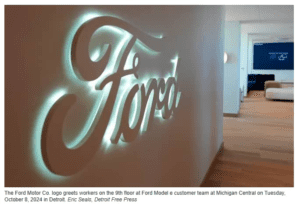Surprisingly Unsafe: The 1992-1995 Pontiac Grand Am
This post also applies to the Oldsmobile Achieva and last-generation Buick Skylark, which were on the same platform and made the same years as the 1992-1998 Grand Am.
Most of the time, when a vehicle was redesigned in the 1990s, it brought a healthy dose of safety progress. The Pontiac Grand Am, with its 1992 redesign, bucked the trend and went backwards. The 1985-1991 Grand Am scored a very respectable 4 stars for the driver and 5 stars for the passenger in a 35-mph full frontal crash test conducted on a 1987 model.
But when the redesigned ’92 Grand Am – tested as its platform mate, the Oldsmobile Achieva – underwent the same test, it turned in just 1 star for the driver (but maintained 5 for the passenger), which a whopping 90% risk of severe injury to the driver. To put it in layman’s terms, you’d probably suffer only minor injuries in an ’85-91 Grand Am, but die in a ’92 in this common crash mode. It was by far the worst performing passenger car of the year, and second only to the by then aging Chevy Astro (which had a marginally higher driver injury risk of 92%) in terms of worst-performing 1992 vehicle.
To their credit, GM made some improvement to the 1993 model Grand Am, although it still landed firmly in the 1-star range for the driver, as well as inexplicably dropping to a low-end 3-star for the passenger. Severe injury risk for the driver dropped from 90% to 58%.
The 1994-model Grand Am finally got a driver airbag. Given the competition and its horrendous crash test ratings, this generation really should have had the airbag from Day 1. Tested as an Achieva, the 1994 finally matched the 1987’s 18% severe injury risk, but maintained a 32% risk for the passenger, earning it 4 stars for the driver and 3 for the passenger.
And, finally, in 1996, the Grand Am got competitive crash test results once again upon the addition of a second airbag, though even the 1996-1998 Grand Am did flunk NHTSA’s then new side impact test, something that would be expected of a compact car designed in the early 1990s.
As such, the 1996-1998 Grand Am, Achieva, and Skylark escape Surprisingly Unsafe status – and even the 1994-1995 are borderline, having significantly worse than average but not bottom-of-the-class performance. The ’92 and even ’93? Definitely much less safe than one would expect for a car of that era.
1985-1991: 18% driver risk, 10% passenger risk.
1992: 90% driver risk, 7% passenger risk.
1993: 58% driver risk, 32% passenger risk
1994-1995: 18% driver risk, 32% passenger risk
1996-1998: 13% driver risk, 14% passenger risk







